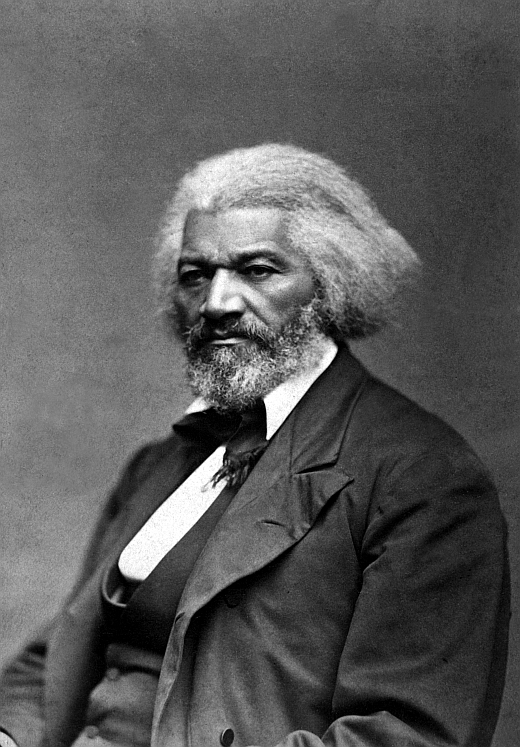
Covey sneaked into the stable, in his peculiar snake-like way, and seizing me suddenly by the leg, he brought me to the stable floor, giving my newly mended body a fearful jar. I now forgot my roots, and remembered my pledge to stand up in my own defense. The brute was endeavoring skillfully to get a slip-knot on my legs, before I could draw up my feet. As soon as I found what he was up to, I gave a sudden spring (my two day’s rest had been of much service to me,) and by that means, no doubt, he was able to bring me to the floor so heavily. He was defeated in his plan of tying me. While down, he seemed to think he had me very securely in his power. He little thought he was — as the rowdies say — “in” for a “rough and tumble” fight; but such was the fact. Whence came the daring spirit necessary to grapple with a man who, eight-and-forty hours before, could, with his slightest word have made me tremble like a leaf in a storm, I do not know; at any rate, I was resolved to fight, and, what was better still, I was actually hard at it. The fighting madness had come upon me, and I found my strong fingers firmly attached to the throat of my cowardly tormentor; as heedless of consequences, at the moment, as though we stood as equals before the law. The very color of the man was forgotten. I felt as supple as a cat, and was ready for the snakish creature at every turn. Every blow of his was parried, though I dealt no blows in turn. I was strictly on the defensive, preventing him from injuring me, rather than trying to injure him. I flung him on the ground several times, when he meant to have hurled me there. I held him so firmly by the throat, that his blood followed my nails. He held me, and I held him.
All was fair, thus far, and the contest was about equal. My resistance was entirely unexpected, and Covey was taken all aback by it, for he trembled in every limb. “Are you going to resist, you scoundrel?” said he. To which, I returned a polite “Yes sir;” steadily gazing my interrogator in the eye, to meet the first approach or dawning of the blow, which I expected my answer would call forth. But, the conflict did not long remain thus equal. Covey soon cried out lustily for help; not that I was obtaining any marked advantage over him, or was injuring him, but because he was gaining none over me, and was not able, single handed, to conquer me. He called for his cousin Hughs, to come to his assistance, and now the scene was changed. I was compelled to give blows, as well as to parry them; and, since I was, in any case, to suffer for resistance, I felt (as the musty proverb goes) that “I might as well be hanged for an old sheep as a lamb.” I was still defensive toward Covey, but aggressive toward Hughs; and, at the first approach of the latter, I dealt a blow, in my desperation, which fairly sickened my youthful assailant. He went off, bending over with pain, and manifesting no disposition to come within my reach again. The poor fellow was in the act of trying to catch and tie my right hand, and while flattering himself with success, I gave him the kick which sent him staggering away in pain, at the same time that I held Covey with a firm hand.
Taken completely by surprise, Covey seemed to have lost his usual strength and coolness. He was frightened, and stood puffing and blowing, seemingly unable to command words or blows. . .
Well, my dear reader, this battle with Mr. Covey — undignified as it was, and as I fear my narration of it is — was the turning point in my “life as a slave.” It rekindled in my breast the smouldering embers of liberty; it brought up my Baltimore dreams, and revived a sense of my own manhood. I was a changed being after that fight. I was nothing before; I WAS A MAN NOW. It recalled to life my crushed self-respect and my self-confidence, and inspired me with a renewed determination to be A FREEMAN. A man, without force, is without the essential dignity of humanity. Human nature is so constituted, that it cannot honor a helpless man, although it can pity him; and even this it cannot do long, if the signs of power do not arise.
—Frederick Douglass, My Bondage and My Freedom, ch. xvii (1855) in Frederick Douglass: Autobiographies pp. 284-86 (Library of America ed. 1994)(Douglass describes his abuse and finally his resistance against Edward Covey, the foreman of a plantation in St. Michael’s on Maryland’s Eastern Shore called “Mount Misery,” who was famous for torturing slaves. The current master and resident at Mount Misery Plantation is Donald Rumsfeld. Read the details in this column by Amy Goodman.)


